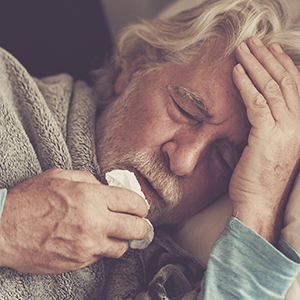What to Do if You Think You Have the Flu

If you are experiencing any of the following symptoms, you may have the flu.
- Fever (or feverish symptoms like the chills)
- Cough
- Sore throat
- Runny or stuffy nose
- Muscle or body aches
- Headaches
- Fatigue (tiredness)
- Possible vomiting and diarrhea (more common in children)
1. Stay home
If you have a fever or other flu-like symptoms, stay home from work, school, and other obligations. Keep potentially sick children at home too.
2. Call your primary health provider
 With the flu, COVID-19, strep throat, colds, and other infections circulating, the first step to feeling better is to share your symptoms with your family provider. Since each infection is treated differently, it’s important to avoid self-diagnosing. Instead, your provider can test, diagnose, and treat you for the right infection.
With the flu, COVID-19, strep throat, colds, and other infections circulating, the first step to feeling better is to share your symptoms with your family provider. Since each infection is treated differently, it’s important to avoid self-diagnosing. Instead, your provider can test, diagnose, and treat you for the right infection.
If you are diagnosed with the flu
If your provider diagnoses you with the flu, they will likely prescribe plenty of rest, fluids, and possibly medicine to help your body fight the influenza virus. Remember to take it easy and do exactly as your provider has advised. Depending on the severity of your symptoms, you may be prescribed antivirals, which can help you feel better faster and have been shown to prevent serious complications.
3. Stop the Spread
| If you’re sick… |
Loved ones around you should… |
| Keep your distance from others |
Avoid getting too close to you |
| Stay home until your provider clears you to go back to work |
Stay home if you’ve been exposed until their provider says otherwise |
| Cover your nose and mouth when coughing or sneezing |
Avoid touching their face |
| Wash your hands frequently with soap and water |
Wash their hands frequently with soap and water |
| Regularly clean and sanitize commonly touched surfaces |
Regularly clean and sanitize commonly touched surfaces |
4. Seek immediate help if severe symptoms start
Depending on the severity of your symptoms, it is important to seek immediate medical attention at one of our urgent care clinics or emergency rooms – especially if you are in a high-risk group, or you feel severe symptoms, such as:
- Your fever is increasing
- You cannot walk
- Difficulty breathing or shortness of breath
- Persistent pain or pressure in the chest
- Confusion
- Inability to stay awake or wake up
- Bluish lips or face
Have Questions? We're Here for You